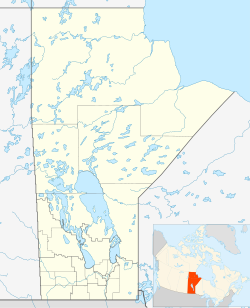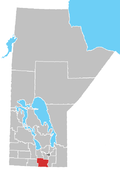Grunthal is a local urban district in the Rural Municipality of Hanover, Manitoba, located 15 miles southwest of Steinbach, and about 50 minutes south of Winnipeg. It had a population of 1,680 in 2016.

The Canadian Conference of Mennonite Brethren Churches (CCMBC) is a Mennonite Brethren denomination in Canada. It is a member of the Mennonite World Conference and the Evangelical Fellowship of Canada.

The Russian Mennonites are a group of Mennonites who are the descendants of German-speaking Anabaptists who settled in the Vistula delta in West Prussia for about 250 years and established colonies in the Russian Empire beginning in 1789. Since the late 19th century, many of them have emigrated to countries which are located throughout the Western Hemisphere. The rest of them were forcibly relocated, so very few of their descendants currently live in the locations of the original colonies. Russian Mennonites are traditionally multilingual but Plautdietsch is their first language as well as their lingua franca. In 2014, there were several hundred thousand Russian Mennonites: about 200,000 live in Germany, 74,122 live in Mexico, 70,000 in Bolivia, 40,000 live in Paraguay, 10,000 live in Belize, tens of thousands of them live in Canada and the US, and a few thousand live in Argentina, Uruguay, and Brazil.

Steinbach is a city located about 58 km (36 mi) south-east of Winnipeg, Manitoba, Canada. Steinbach is the third-largest city in Manitoba, with a population of 17,806, and the largest community in the Eastman region. The city is bordered by the Rural Municipality of Hanover to the north, west, and south, and the Rural Municipality of La Broquerie to the east. Steinbach was first settled by Plautdietsch-speaking Mennonites from the Russian Empire in 1874, whose descendants continue to have a significant presence in the city today. Steinbach is found on the eastern edge of the Canadian Prairies, while Sandilands Provincial Forest is a short distance east of the city.

Altona is a town in southern Manitoba, Canada, about 100 km south-west of Winnipeg and 158 km north of Grand Forks, North Dakota. The population at the 2011 Census was 4,123 residents. Old Altona was founded in 1880 by Plautdietsch-speaking Mennonites from the Russian Empire. It is surrounded by the Municipality of Rhineland. Much of the surrounding area is devoted to farming and agriculture-based business.
Kleefeld is a local urban district located in the Rural Municipality of Hanover, Manitoba, Canada.
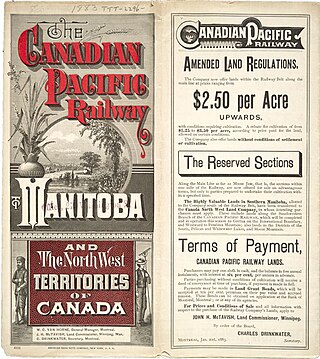
A block settlement is a particular type of land distribution which allows settlers with the same ethnicity to form small colonies. This settlement type was used throughout western Canada between the late 19th and early 20th centuries. Some were planned and others were spontaneously created by the settlers themselves. As a legacy of the block settlements, the three Prairie Provinces have several regions where ancestries other than British are the largest, unlike the norm in surrounding regions.
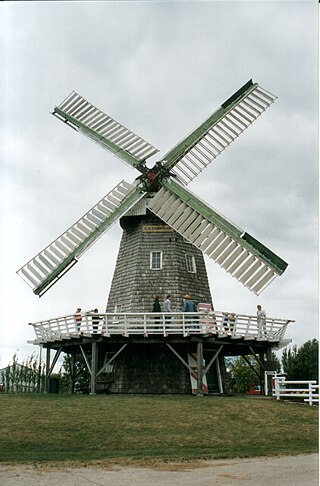
Mennonite Heritage Village is a museum in Steinbach, Manitoba, Canada telling the story of the Russian Mennonites in Canada. The museum contains both an open-air museum open seasonally, and indoor galleries open year-round. Opened in 1967 and expanded significantly since then, the Mennonite Heritage Village is a major tourist attraction in the area and officially designated as a Manitoba Signature Museum and Star Attraction. Approximately 47,000 visitors visit the museum each year.
The Rural Municipality of Rhineland is a former rural municipality (RM) in the Canadian province of Manitoba. Since 1876, the area made up part of the Mennonite West Reserve. The R.M. of Rhineland was originally incorporated as a rural municipality on February 14, 1880 and later absorbed the neighbouring RM of Douglas in January 1891. It ceased on January 1, 2015 as a result of its provincially mandated amalgamation with the towns of Gretna and Plum Coulee to form the Municipality of Rhineland.
Reinland is a Mennonite village in Manitoba located in the Rural Municipality of Stanley, about ten minutes south of Winkler and about five minutes north of U.S. border. Its population numbers about five hundred, with an agrarian economy.

Blumenort is a local urban district in the Canadian province of Manitoba. It is located in the Rural Municipality of Hanover, 4.1 kilometres north of the city of Steinbach. It was founded in 1874 by Plautdietsch-speaking Mennonite farmers from the Russian Empire. Today, its economy is based on agriculture and the service industry.

A housebarn is a building that is a combination of a house and a barn under the same roof. Most types of housebarn also have room for livestock quarters. If the living quarters are only combined whith a byre, whereas the cereals are stored outside the main building, the house is called a byre-dwelling.
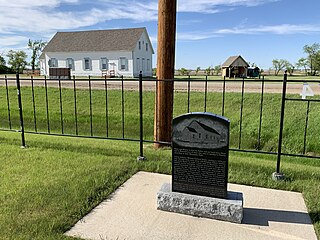
Randolph, originally known as Chortitz, is a small community in the Rural Municipality of Hanover, Manitoba, Canada. The community has an estimated population of 70 and is located 1.6 kilometres north of Highway 52 on Provincial Road 206 about 11 kilometres west of Steinbach. Randolph is located within a half kilometre of the longitudinal centre of Canada.
The Daily Bonnet is a satirical Mennonite website, known as The Unger Review as of 2023. It was created by Andrew Unger and launched in May 2016. It features news stories and editorials, with the structure of conventional newspapers, but whose content is contorted to make humorous commentary on Mennonite and Anabaptist issues.
Abraham Dueck Penner was a businessman and politician from Steinbach, Manitoba, Canada, who was instrumental in transforming and modernizing the lifestyle of the conservative Kleine Gemeinde Mennonites of the region.

The East Reserve was a block settlement in Manitoba set aside by the Government of Canada exclusively for settlement by Russian Mennonite settlers in 1873. Most of the East Reserve's earliest settlers were from the Kleine Gemeinde or Bergthaler Mennonite churches.

The West Reserve was a block settlement plot of land in Manitoba set aside by the Government of Canada exclusively for settlement by Russian Mennonite settlers in 1876.

Andrew Unger is a Canadian novelist and satirist from Steinbach, Manitoba. He is the author of the Mennonite satire website The Daily Bonnet, now known as The Unger Review, and the satirical novel Once Removed.
Elmer Hildebrand is a Canadian businessman, investor, philanthropist and broadcaster from Altona, Manitoba and current CEO & President of Golden West Broadcasting (Canada). Hildebrand joined Golden West in 1961, just four years after its inception, and served as president for many decades, growing the company to more than forty radio stations, and the largest independent radio broadcaster in Canada. He is a former director of the Canadian Association of Broadcasters and was inducted into the CAB Hall of Fame, Manitoba Business Hall of Fame, and Manitoba Hockey Hall of Fame. He also served as President of the Mennonite Heritage Village in Steinbach, Manitoba.

